
a treasure-trove of literature
treasure found hidden with no evidence of ownership
(and our other authors) or get HELP Reading, Downloading and Converting files)
or
SEARCH the entire site with Google Site Search
 |
Project Gutenberg
Australia a treasure-trove of literature treasure found hidden with no evidence of ownership |
BROWSE the site for other works by this author (and our other authors) or get HELP Reading, Downloading and Converting files) or SEARCH the entire site with Google Site Search |
Title: The Vengeance of Durand Author: Rex Beach * A Project Gutenberg of Australia eBook * eBook No.: 1900431h.html Language: English Date first posted: April 2017 Most recent update: April 2017 This eBook was produced by: Walter Moore Project Gutenberg of Australia eBooks are created from printed editions which are in the public domain in Australia, unless a copyright notice is included. We do NOT keep any eBooks in compliance with a particular paper edition. Copyright laws are changing all over the world. Be sure to check the copyright laws for your country before downloading or redistributing this file. This eBook is made available at no cost and with almost no restrictions whatsoever. You may copy it, give it away or re-use it under the terms of the Project Gutenberg Australia Licence which may be viewed online.
GO TO Project Gutenberg Australia HOME PAGE

Published in The Motion Picture Magazine - February, 1913 as the storyline for the silent, black and white movie, “The Vengeance of Durand or The Two Portraits.” The movie was produced by Vitagraph, directed by J. Stuart Blackton, and starred L. Rogers Lytton and Edith Storey. The movie was remade in 1919, also silent and black and white, staring Alice Joyce.

There was a tinge of scarlet in the very air of the place that one could not merely see, thru the haze of smoke, but that one inhaled, as well, in the vivid blend of perfumes; that one heard in the wild lilt of the orchestra, drenched in the voices of beautiful women; that one felt passing into his or her veins thru the fiery liqueurs and volatile, sparkling wines that gave zest to every rich repast. Here was the last word of sensuous gayety, and the Temple of Feeling. Wine, women and song—and the kind of men who made them their gods.
This was “Maxime’s.”
The only discordant note in the garrulous scene was rendered by the occupants of a little table, who seemed to be crowded close against the wall by the very reason of the blaring contrast. Neither seemed to be interested in the scene. The man was excited, in a suppressed manner. His keen eyes sought the door, or scanned every face moving thru the gray pall that hung above the chatting, laughing, singing audience. Occasionally, they returned to the face of his young and exquisitely beautiful companion, who seemed strangely frightened over the influence of the place. At length, the man drew his hands together very tightly beneath the tablecloth, and his legs went taut against his chair, as tho bracing himself for an ordeal.
“Beatrice,” he said, just loud enough to be heard across the table, “do you know why I have brought you here?”
The girl gave a quick, almost frightened, look about her, and shook her head.
“Do you recall what happened twelve years ago today?”
“Perfectly”—the girl shuddered, and a glint of vengeance came into her eyes that was reflected a hundred-fold in those of her companion—“my mother—died.”
“Was killed,” corrected the man. “I remember that your little hand touched the fresh wound above her heart.”
“But, father, why speak of it—now—here?”
“Because, daughter, tonight begins the sequel.” He leaned over the table and laid his hand, almost pleadingly, on her fair arm. “You remember all—all?”
In the excitement of the moment, Beatrice had not noticed the party of three men who had come and taken their seats at the table in the center of the room, which, evidently, had been reserved for them as a mark of distinction.
On the contrary, the man’s eyes had covertly observed their entrance, and had kindled anew. “A man had poisoned my life’s happiness,” he continued; “a man had come between me and my love for your mother, and, at length, the same man destroyed her. That man is free today—tonight.”
The girl’s eyes, too, had, at length, rested on the group of men at the near-by table. At her father’s last words, she swung around. “Free? Strange; I had always thought him dead, as he deserved. Why did you not?” she looked at her father almost accusingly.
“In instantaneous death there is no suffering to speak of. I have planned for twelve long years that this man shall taste some of the cruel, writhing tortures of the heart and soul that have been visited upon me. I have been waiting for you to help me.”
The girl met his gaze instantly, and there was in her eyes the same intense hatred against the common enemy. “Father,” she said, with quiet determination, “I would give all I have to wreak vengeance upon the creature!”
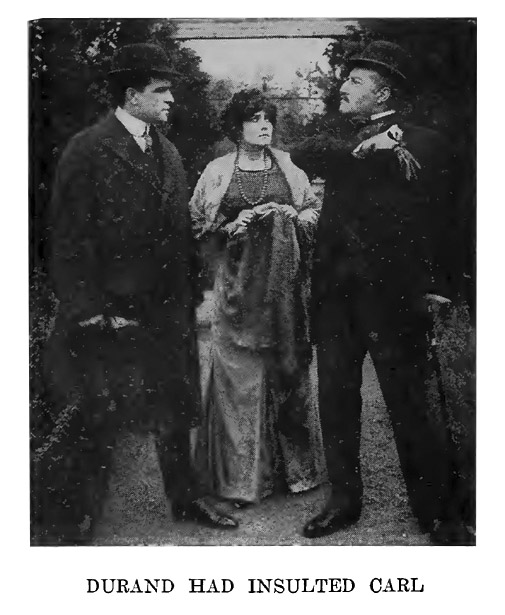
“My prayers for twelve years have not been in vain. Now listen. I have come to this place tonight that you might see this fiend. That he, too, might gaze on your beautiful face, and, mayhap, learn to worship it, as a score more have done. I mean to leave the room at once. Have no fear. I have a dozen strong fellows within a few feet of you, who are your paid protectors. I shall await below in our car. Join me in a half hour. The moment you are alone, you will become the most conspicuous woman in the room. He will see you. Don’t look yet—but he is the handsome fellow who has just entered. The others are all kow-towing to him. Good-by, dear. We do it in the name of your mother, remember.” The next moment he had passed unnoticed from the room. Beatrice turned her gaze upon the group of men at the near-by table. The face of the man she sought was averted. One of the men caught her eye, and immediately began to try to attract the attention of his popular companion.
* * * * * * * * * *
Two men sat in the great studio of Carl Franklin, each seemingly intent on nothing more engrossing than the smoke rings from a narghyl, at which they both puffed, now and then.
“Carl,” broke in the elder of the two men, with evident hesitancy, “I have never before seen you in quite the mood that seemed to obsess you last night at Maxime’s.”
“Did you find out who the girl was?” was the other’s only reply.
“No; her identity seems strangely guarded. You still desire to know who she is?”
“I must know.”
“Carl—you are in love with her—yet—”
“Yet what?”
“I can swear that I never saw such a look of grief, almost terror, come into your face as when you looked, for the first time, at that beautiful creature last night.”
“I did not know you twelve years ago, did I, Theophile?”
“No; you had but just come from America.”
“I had just killed the woman I loved above all things on earth.”
The other recoiled. “Carl, you!—mon Dieu!”
“Listen. I did not murder her, as was supposed by many. Few knew that her husband and I were clandestinely fighting a duel that morning. She sprang between us. I fled. The coroner’s jury dubbed it an ‘accident.’ This I swear to you: no other person, least of all that poor woman, had ever been told that I loved her. The husband suspected it and baited a trap of insult for me, by abusing and beating her in my presence. Would to God I had killed him on the spot!”
There was a long silence, and then Theophile moved to the other’s side and laid his hand gently and reassuringly on his shoulder. “And the girl of last evening?”
“There was something—something of Marion about her.”
“Perhaps it came from suggestion, because of the anniversary? But, my dear Carl, why, if it has any suggestion of that terrible affair, do you not abandon it? As a friend, I implore you to do this.”
“I have.”
“Thank God!” murmured Theophile, with a sigh of relief.

They had relapsed into another deep silence, when the bell in the high-ceiled hall without pealed a jangling announcement.
“Some one to keep me busy, and to get me away from my grim tormentor. My old enemy, her husband, sought his revenge in having me paint her picture, I may remark. He used to hide behind the portiere and observe us.”
“I have heard more than one of our colleagues say that to paint the woman he likes often results in the picture of the woman he loves. Ah, I hear the voice of your sitter—a very lovely voice, too.”
“She comes well recommended, but incognito; I neither know her, nor her face.”
There was a soft rustle of silk in the doorway, and the maid’s voice called: “Madame, to see monsieur.”
The two men rose, but stepped back in alarm at the sight of the woman in the doorway. She was the same they had seen in Maxime’s the night before. “Pardon, madame,” said Carl, with an effort; “I am Monsieur Franklin.”
The artist could not fathom the look she gave him. It seemed filled with a hundred meanings, the final impression being one of alluring friendliness and fascinating beauty. His heart leaped to meet an indefinable something in the girl that seemed as old as the hills to him. Her presence seemed fraught with both good and evil significance.
Unconsciously, almost, he proceeded with his work in precisely the same way that he had painted that fatal picture years before. The present subject was of the same type—there was a little of ever-present sameness in everything about her.
The fascination grew daily upon him—the way she had of casting down her eyelids, and of flashing quick glances at him, pointed with flame that melted into soft smiles instantly. And then, one afternoon, when he was a little late in returning to the studio, he found her at the piano, playing softly, and her eyes with all the discomforting fires of hatred gone from them. At length, she threw her head upon her arm with a sigh that stole thru the crevices of his heart like a knife-blade.
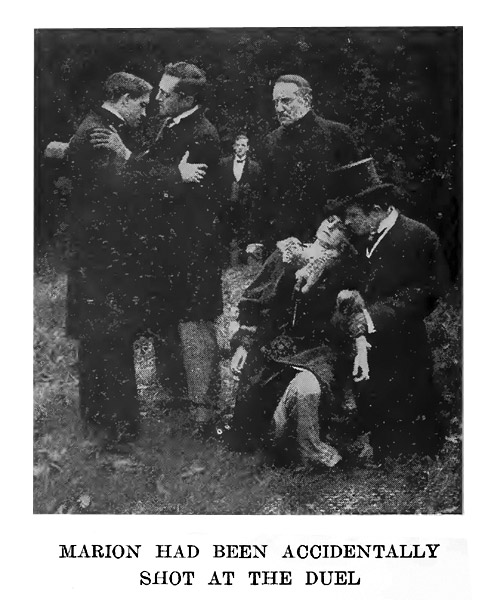
Carl had come to love the woman madly. The message was in his voice as he spoke. “Mademoiselle!”
The girl drew her head up quickly. Into her eyes sprang a look of half-wild defiance, as tho the man were forcing her into some compact against her will.
“Monsieur—I have been waiting for you”—now the soft half-promises came into her expression that had been leading him by the heart-strings day by day—“to begin your work. But I am feeling a little out of sorts just now, and think, after all, I shall not sit today.
At the suggestion of her feeling badly, Carl’s mad desire to confess his passion resolved itself into a wave of profound sympathy.
“I am sorry, very sorry, that mademoiselle is feeling badly,” he condoled, in a voice so tender that she gave him a quick, enigmatical look that again struck fire in his breast.
“But tomorrow I shall come and be your perfect subject—yours to command at will.” She passed to the doorway, where she paused and turned. Their eyes met. She slowly came toward him where, in another moment, he seemed about to clasp her in his arms. But she stopped, almost with a jerk, when within a pace of him and coolly extended her beautiful hand. Before he could press it to his lips, she had taken it away again and rushed to the doorway once more. “Adieu—until tomorrow!” There was challenge, promise and—”
Carl stood where she had left him, his mind in a whirl, until he heard the hall-door close softly.
“Tomorrow,” he repeated, again, and again, taking his stand before her half-finished picture, and studying the expression he had there limned on her face. At length, he sprang back with a glad cry. “Her soul cannot lie—and here I have caught her soul—her soul loves!”
The girl was swiftly motored to a suburb of Paris, and then driven thru the grilled gates of a foliage-hid chateau. She hastily alighted before the footman could assist her, and ran quickly up a grand stairway, and thence to a little room whose interior was a showery mass of pink silk and chintz. Without pausing to remove her wraps, she quietly turned the key in the door, threw herself on a dainty couch, and began sobbing, softly.
It might have been twenty minutes later that she became aware of some one tapping on the door. She rose, listlessly, and opened the door without ado.
Her father drew back in amazement. “Beatrice, what is the matter?”
“I am ill, that is all,” she replied, tonelessly.
“The blackguard has not been—”
He paused, an angry glitter in his eyes.
“He has done nothing,” interrupted Beatrice, wearily.
“You mean that there has been no—no progress whatever?” He was excitedly crestfallen.
“He loves me,” returned Beatrice, simply. He did not notice the sigh. “Thank God—now we have him, and we will spend years, if necessary, in crushing him!” The man was pacing up and down in the excess of his savage joy.
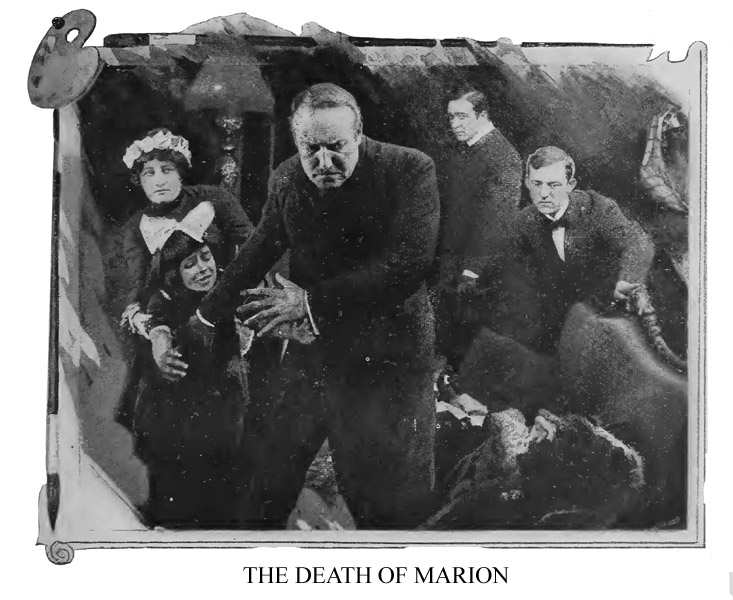
“But, father, this has worn me out.” She was protesting now. “We have sown the seeds. Can’t we go away—at least for a while?”
“Revenge as sweet as this fattens and nourishes me. I cannot understand you, Beatrice.” He looked into her eyes sharply. But they told only a tale of great weariness.
“But we might return later—and—resume. Father, will you have no thought of my health in this matter?”
“Beatrice,” he asked, solemnly, “have we thought of anything—but the death of your dear mother? We have both taken a solemn oath; yours was even more relentless than mine. We are to make this man suffer to the point of death. Then, and then only, shall the torture let up—for me to kill him.” It was apparent, for the first time, to the girl’s changed viewpoint, that her father was suffering from a mania of revenge.
“As I have sworn, then so shall I act, father. What next am I to do?”
He looked at her in surprise. “Has your wonderful cunning failed you? If we can best accomplish our end thru marriage, then you shall marry him!”
“Yes, father.”
Beatrice found flowers placed in several vases about the studio. Carl met her, and there was a soft and luminous light in his eyes that faded before the coldness of her greeting. During the entire two hours of her sitting her eyes were upon him. And there had returned to them contrition and the old, sweet promise, by the time the maid announced tea.
“You will surely stay today?” he asked, eagerly.
For a mere instant she hesitated. Then she shook her head, again the frigid stranger to him.
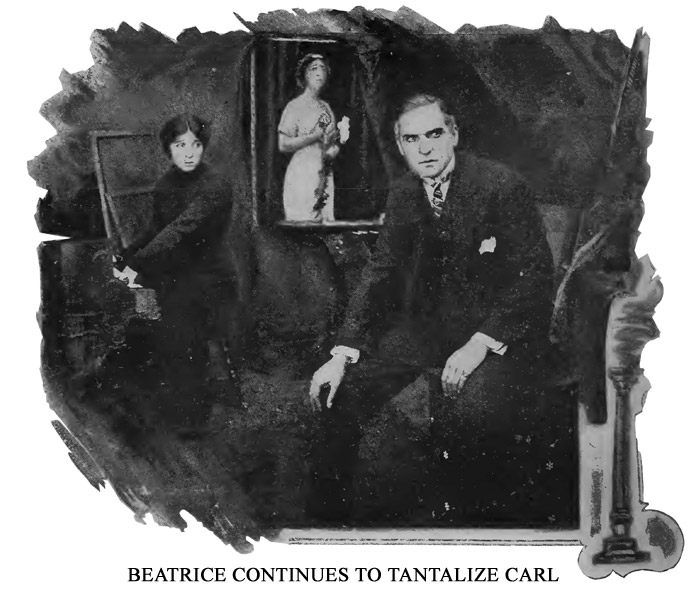
“No—but—”
He watched her face as it seemed to change with many moods, while she paused, irresolute. Then she laid her hand on his sleeve, almost caressingly.
“Instead, wont you come and take tea with me at seven—and spend the evening—please?”
“Why add ‘please’? You have said ‘come’—nothing on earth could stop me!”
* * * * * * * *
Beatrice’s face was very pale as she entered the house. She went directly to her father’s room. “He will be here tonight. I shall carry out my part of the compact under one condition.”
He looked at her a moment. “You impose conditions?” His satisfaction was lost, somewhat, in the harshness of his tone. “Any condition shall be yours, so long as you turn him over to me alive.” He opened a secret drawer and raised a pistol of German manufacture. “Now what is it you demand, Beatrice?”
“That you leave him to me until I shall summon you.”
“Very well,” he consented, with an impatient shrug of his shoulders.
* * * * * * * *
Carl found Beatrice in the tiny music-chamber just off the conservatory that had supplied the hundreds of clusters of rare flowers that embowered the room. She pretended not to hear him as he entered, tho the maid’s announcement rose above the low rhythm of the music she played. She did not look up until he had reached her side, and then it was to lean back, the soft masses of her deep brown hair quivering against his sleeve, and her eyes looking straight into his heart. He stepped back, with a supreme effort of restraint.
“Mademoiselle, you are even more lovely tonight.”
“No,” she assured him, with a little laugh, as she placed the tips of her fingers in his palm; “I assure you that I am at my very worst tonight.”
Carl gazed at her now with undisguised affection. “Mademoiselle, what is your name?” he pleaded, gently.
“Beatrice,” she murmured, and seeing that he was about to make some sort of declaration, she turned quickly to the piano again. “Listen, I shall play—for you.” The last two words gripped Carl like a vise. Suffering sweet agonies, he stood afraid of what the least movement on his part would result in.
Then Beatrice sang. It was one of the old songs that her mother had taught her. It flowed into Carl’s ear and affected his heart like new wine. He stood panting from the terrible emotion that inundated his soul. The song drifted off into the gloaming shadows of the salon—
. . . Dear heart, to mine be true!
The soul of the song swayed her as she turned and lifted her eyes, which unmistakably bore the burden of it. But Carl needed no further portents of promise. He had sprung to her side, and had her in his strong arms, the words: “Beatrice, I love you!” repeatedly on his lips.
Beatrice’s arms had stolen about his neck, and she clung to him, forgetting and forgiving all things in that sublime moment, her eyes half-closed in ecstasy. Then their lips met, and the complete avowal of love was his.
A minute, or an hour, might have passed. They might not have granted the passage of any time at all had not there come a mighty crash of glass that startled them both into the world of reality again.
The girl sprang rigidly to her feet, pulling herself forcibly away from him. Carl was gazing, with something akin to terror, at the man who stood near a great mirror that he had just shattered in his passion at the sight before him. In one hand, the man clasped, nervously, the German machine-gun.
“There, Beatrice, that is he,” he shrieked; “your mother’s slayer! Ask him to deny it!”
Carl turned to the girl, appealingly. Beatrice surveyed his countenance, and seemed to wait for some explanation. Suddenly her face changed. It became the reflection of her father’s in its intense hatred. She threw back her head and laughed long and loud, moving slowly over to her father’s side.
“Well, were you not satisfied to rob me of my wife, that you must return like a beast to carry off my only child?” taunted the man. He had carefully locked the outer door, and stood with his back against it.
Carl’s face had assumed a terrible expression at the realization of his horrible predicament, and the perfidy of the man who was responsible for it. Perhaps the deception of the woman he would love with his last breath, had frozen his soul, and set his brain on fire. For a full minute he heard, he saw nothing, yet felt all the tortures man is capable of. He shuddered like a reed. Then he slowly folded his arms and turned his now gray face toward his tormentors.
“Beatrice, you’ve done splendid work!” cackled the girl’s father. “Look at his face! I can see the reflection of your mother’s wounds in his eyes!”
Beatrice’s laugh still curdled the air with all the harshness of hysteria. Still Carl said nothing, tho each taunt kindled a fresh fire in his eye and drove reason farther and farther afield.
“She loved you, woman-killer, just as her mother before her did, only to lure you nearer destruction. She would kill you herself, if I relinquished that privilege—she whose kisses were so sweet on your lips but a moment ago. Her love is as fickle as her mother’s, but her hatred is as steadfast as her father’s. Look, Beatrice, see the lines grow in his face!”
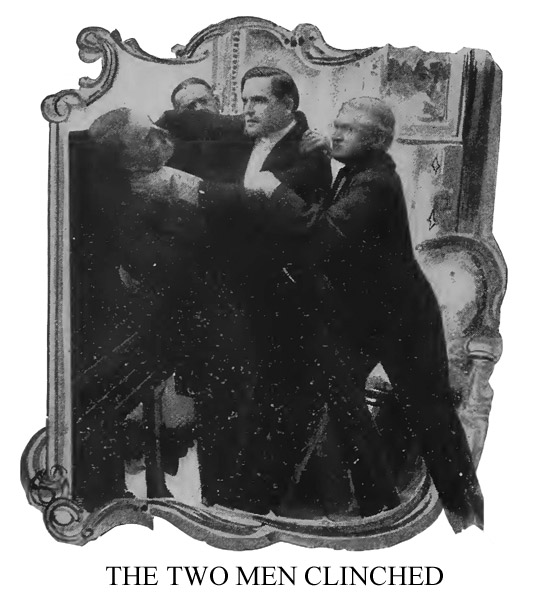
Carl had gone mad now, but the restraint, that had grown deeper and deeper for twelve years, still held him, like a lion bound with threads. His eyes never left the girl, while each dart of her father, barbed with the poison of hatred, plunged straight into his heart and there quivered.
Beatrice was half-sobbing now, and stood leaning against the door, shaking her clenched hands wildly.
“See what a coward he is, Beatrice. I could tweak his nose, and he would be afraid to lift his hand.” Carl suddenly braced himself, as tho to rush upon the man. “Ah, the gay lover of other men’s women awakes! Now, Beatrice, to show you that all my practice has not been in vain, I shall maim and mangle this ravisher until he crawls in a trail of his own blood at my feet! Now for his right hand—shredded—so that he can do little damage. This for the love my wife gave you!” He raised the gun, steadily, and looked down the glittering sight, a demoniacal grin convulsing his face.
But Carl was at last loosing all the pent-up fury that the lost love of woman can raise in the sinews of a powerful man. The last taunt broke down all barriers, and he threw himself forward, with the roar of a wild beast, just as his enemy raised the heavy gun.
Three rapid shots rang clear, and a crimson jet rippled thru the jagged gash that had been ripped along the fine face of Carl Franklin. But his life had been saved, for the time being at least, by the unexpected action of Beatrice. With a cry of horror, she had sprung toward her father’s arm, and knocked it a few inches aside.
Before Carl could reach her side, her father had knocked her down with an angry sweep of the weapon.
The two men clinched, with the hungry grip of long hatred. Back and forth they swayed, crushing everything in their pathway; fighting only to kill. That they knocked over two great lamps and, thereafter, fought in semi-darkness, did not affect their struggle in the least. But soon the room brightened from a desultory glare that brought a heavy smoke with it. But darkness would have sufficed just as well for a man’s five fingers to have sought out his enemy ‘s windpipe.
Carl was the stronger and heavier, but that accursed wound was bleeding like a geyser, some part of his strength going with every drop of it. Long since it had blinded him; it now aided his enemy in choking him. He was conscious of a burning heat, too, and it took all of his strength to keep his senses from snuffing out. With an effort, he tried to peep out thru the crimson flood. There he thought he saw Beatrice standing over her father with the gun, which had fallen in the fray, raised above his head. Carl laughed, and then sank back, with a final shoot of pain, like that of a live flame licking his hand.
Carl’s next sensation was of the same hot streak scorching his hand and arm. He tried to look down, but something held his face in the grip of a vise. Now he remembered. He was in the clutches of his fierce enemy. He struggled. Then there flowed thru his consciousness the sweetest music he had ever heard. It was a woman’s voice.
“There, dearest, you are only to keep quiet for just a wee bit of a while yet.” He closed his eyes instantly. The voice had suddenly become torture, at the recollection of it all. He sighed and lay back, patiently awaiting the blow that he expected would surely follow.
“Darling, open your eyes. It is I, Beatrice. Your friend, Theophile, is here, too.”
He was yet afraid. “Where is—is he?” he was ungracious enough to ask.
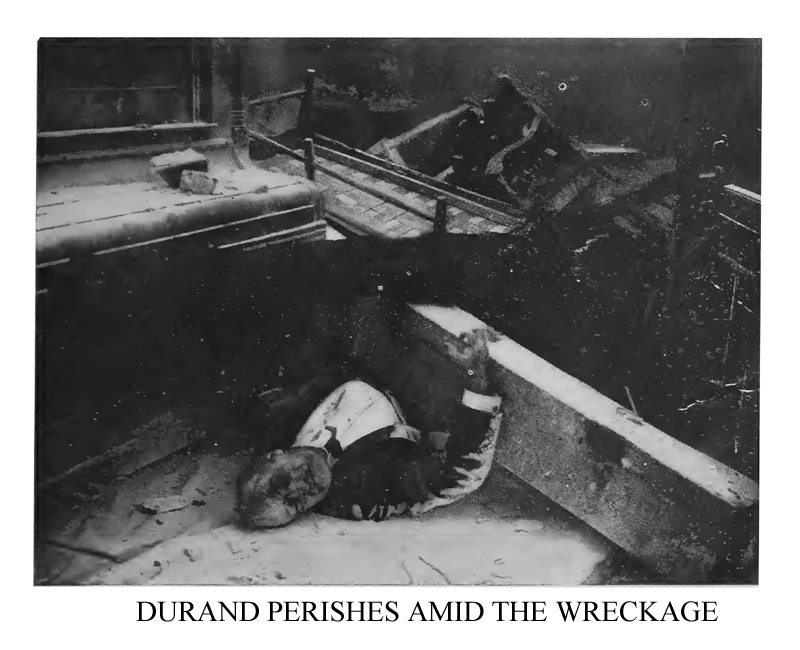
“My father was burned to death in the fire,” said the girl, in a subdued voice. “You, dear Carl, are in the hospital. Theophile has told me all.”
“Except that it was mademoiselle that saved you. I’ll tell you about it later—when I return!”

This site is full of FREE ebooks - Project Gutenberg Australia